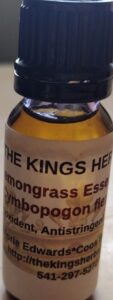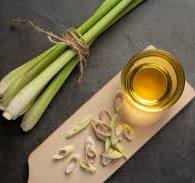Description
Lemongrass essential oil is known for its fresh, citrusy aroma and offers several benefits:


$15.00

Lemongrass is a versatile oil known for its refreshing scent and various benefits. To safely use:
Dilution: Always dilute lemongrass oil with a carrier oil, A typical dilution ratio is about 3-5 drops per tablespoon of carrier oil. This helps prevent skin irritation.
Patch Test: Before applying the oil more broadly, perform a patch test. Apply a small amount of the diluted oil to a small area of skin, like the inside of your wrist or elbow. Wait 24 hours to see if there is any reaction. If you experience redness, itching, or irritation, do not use it.
Application: After diluting and testing, you can apply the oil to specific areas where you want to reap its benefits. Common uses include:
Sore Muscles: Massage the diluted oil into aching muscles for relief.
Oily Skin: Apply to areas prone to oiliness or acne.
Frequency: You can apply lemongrass oil 1-2 times daily. Adjust the frequency based on your skin’s sensitivity and your personal comfort.
Avoid Sensitive Areas: Be cautious not to apply lemongrass oil near the eyes, on broken skin, or on sensitive areas of the body.
Lemongrass essential oil is packed with bioactive compounds like citral, geraniol, and citronellal. These bestow it with a range of pharmacological actions, including antifungal, antibacterial, anticancer, and notably, antioxidant properties. These benefits are widely utilized in the pharmaceutical, cosmetics, and food preservation industries.
Furthermore, a study demonstrated the oil’s impressive free radical scavenging capabilities, as evidenced by its performance in DPPH and Nitrogen Oxide assays, highlighting its potential as a robust antioxidant. This reinforces the diverse and beneficial aspects of lemongrass essential oil in health and wellness.
With its fresh and citrusy aroma, lemongrass essential oil is widely used in skincare and cosmetics, in hair care products, soaps and bath products. It’s a popular fragrance in perfumes, deodorants, candles, and air fresheners, and acts as a natural insect repellent. Additionally, lemongrass oil can be found in some household cleaners, therapeutic balms and rubs, aromatherapy diffusers, and massage oils.
Keep in mind this oil may be skin sensitive. Adding more carrier oil will not decrease the effectiveness of the oil.
Lemongrass oil, with its refreshing citrus scent, has a variety of applications. For topical use, dilute it with a carrier oil, like coconut or Jojoba oil at a ratio of 2-3 drops of lemongrass oil to every teaspoon of carrier oil; this can be applied for skin care, massage, or as a natural insect repellent. For aromatic purposes, add a few drops to a diffuser or a pot of boiling water to fill the room with its invigorating fragrance. Always conduct a patch test on a small area of skin before full application, and consult a health professional before ingesting or using it for therapeutic purposes.
In conclusion, lemongrass essential oil stands out as a natural powerhouse, offering a spectrum of health and wellness benefits. From its roots in traditional Southeast Asian cultures to its modern-day applications in aromatherapy and holistic medicine, this oil has proven its worth. Its ability to alleviate pain, reduce stress and anxiety, combat bacterial and fungal infections, and even act as a natural insect repellent, makes it a valuable addition to anyone’s wellness toolkit. While more research is needed to fully understand and harness its potential, the existing studies are promising. As with any natural remedy, it’s important to use lemongrass essential oil responsibly and consult healthcare professionals when necessary. Embracing the natural, invigorating, and therapeutic properties of lemongrass essential oil could be a step towards a more balanced and healthful lifestyle.
Don’t confuse lemongrass with other plants and ingredients that have similar names, including citronella oil, lemon, eucalyptus, and citronella (stone root). These are not the same.
Lemongrass in plant form is used as an infused tea.
Lemongrass essential oil is known for its fresh, citrusy aroma and offers several benefits:
